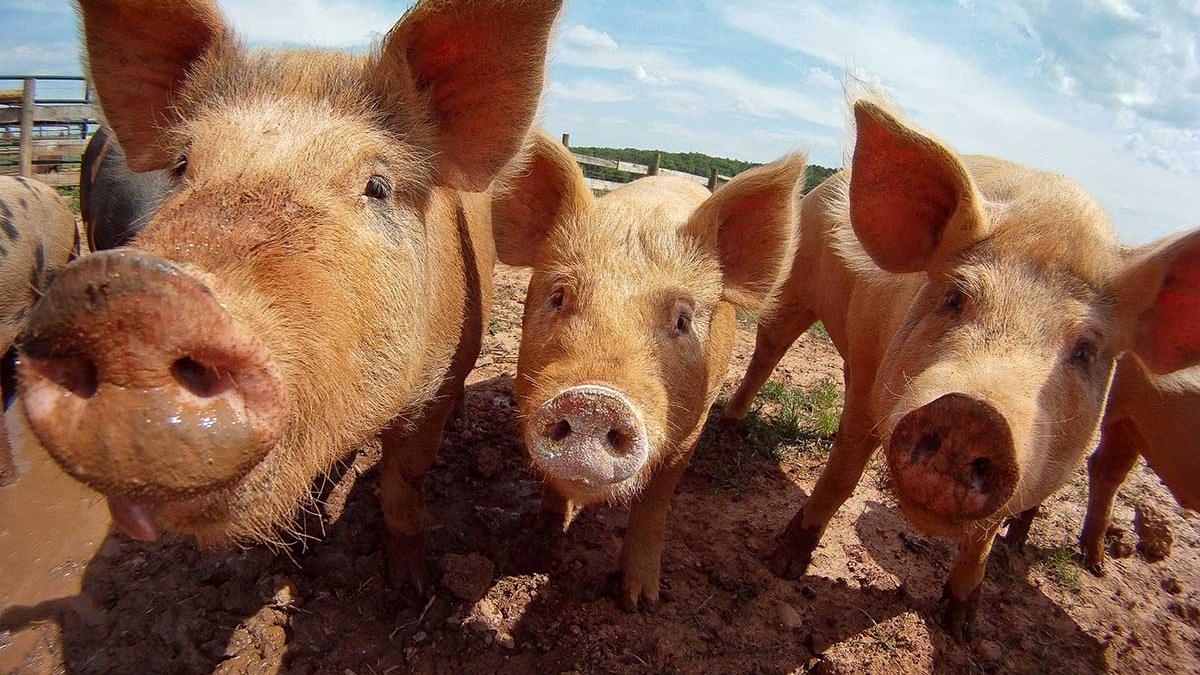Classical Swine Fever

Classical swine fever is a highly contagious disease of pigs caused by a virus. Although the United States has been free of this disease for more than 40 years, the virus is present in the Caribbean and South America, raising concern for its potential introduction here.
The virus causes a wide range of clinical signs and can be difficult to recognize because it may look like other diseases. Pigs previously exposed to the virus or infected with a less severe strain of the virus may have mild or no clinical signs. Severe infections can kill pigs, especially in young herds with naive immune systems. Pigs that recover may still carry the virus for varying periods of time and spread it to other pigs.
- Depression (hunched posture, drooping head)
- Anorexia
- High fever (106 °F)
- Huddling
- Constipation followed by diarrhea
- Reddened eyes
- Skin hemorrhages (when small blood vessels burst just beneath the skin), particularly around the ears, abdomen, or inner thighs
- Incoordination or weakness, especially in young pigs
- Reproductive issues, including stillbirths or malformed piglets
Healthy pigs get the virus from contact with infected pigs or contaminated pens, feed, equipment, or clothing. Pigs can also get it from eating untreated food waste that contains infected pork scraps.
Follow strict biosecurity protocols. On-farm biosecurity is critical for preventing classical swine fever. All pig owners and anyone who works with pigs should know and follow strict biosecurity practices to protect U.S. pigs. Work with your veterinarian to assess your biosecurity plans and make improvements as needed.
Keep your pigs away from feral swine. If your pigs have access to the outdoors, use double fencing and other measures to make sure your pigs don't come in contact with feral swine.
Don't bring classical swine fever home with you when you travel abroad:
- Don't bring pork products from countries that have the disease. They can carry classical swine fever into our country.
- If you visit a farm while overseas, tell U.S. Customs and Border Protection when you return to the United States.
- Thoroughly clean and disinfect, or dispose of, any clothing or shoes that you wore around pigs before returning to this country.
- Do not visit a farm or property with pigs, livestock market, sale barn, zoo, circus, pet store with potbellied pigs, or any other animal facility with pigs for at least 5 days after you return to the country.
There's no treatment for classical swine fever other than supportive care. Vaccines are available but require USDA approval for use (such as in an outbreak).
Report Signs of Animal Disease
Producers or owners who suspect an animal disease should contact their veterinarian to evaluate the animal or herd. Find an accredited veterinarian.
Animal health professionals (veterinarians; diagnostic laboratories; public health, zoo, or wildlife personnel; and others) report diagnosed or suspected cases of nationally listed reportable animal diseases to APHIS Area Veterinarians in Charge and to the State animal health official as applicable under State reporting regulations.
Controlling Classical Swine Fever
The ongoing spread of African swine fever in Asia, Europe, and the Caribbean as well as classical swine fever in the Caribbean and South America has spiked concerns about their potential to enter the United States. APHIS is leading nationwide surveillance for both diseases.
- African and Classical Swine Fever Integrated Surveillance Plan (643.91 KB): Outlines current diagnostic and surveillance methodologies for both diseases
- Swine Hemorrhagic Fevers Surveillance Dashboard: Allows users to interact with African and classical swine fever surveillance data
- Swine Hemorrhagic Fever Surveillance Evaluation Brief (555.71 KB): Highlights successes of the integrated surveillance plan after its first year of implementation and opportunities for improving it
Surveillance activities target:
- Swine suspected of having African swine fever or classical swine fever
- Samples taken from sick pigs that are submitted to an APHIS-approved National Animal Health Laboratory Network laboratory
- Pigs condemned at slaughter by USDA's Food Safety and Inspection Service
- Pigs raised outdoors with potential exposure to feral swine or pigs fed garbage (considered high-risk pigs)
- Samples from feral swine collected by APHIS' National Wildlife Disease Program and National Wildlife Research Center
Consider enrolling in the U.S. Swine Health Improvement Program. This program is sponsored by APHIS Veterinary Services and is an initiative supported by State and industry partners. It provides standards for safeguarding, improving, and representing the health status of swine across participating farm sites, supply chains, States, and regions. It helps support the current and future health assurance needs of the 21st century U.S. pork industry.

